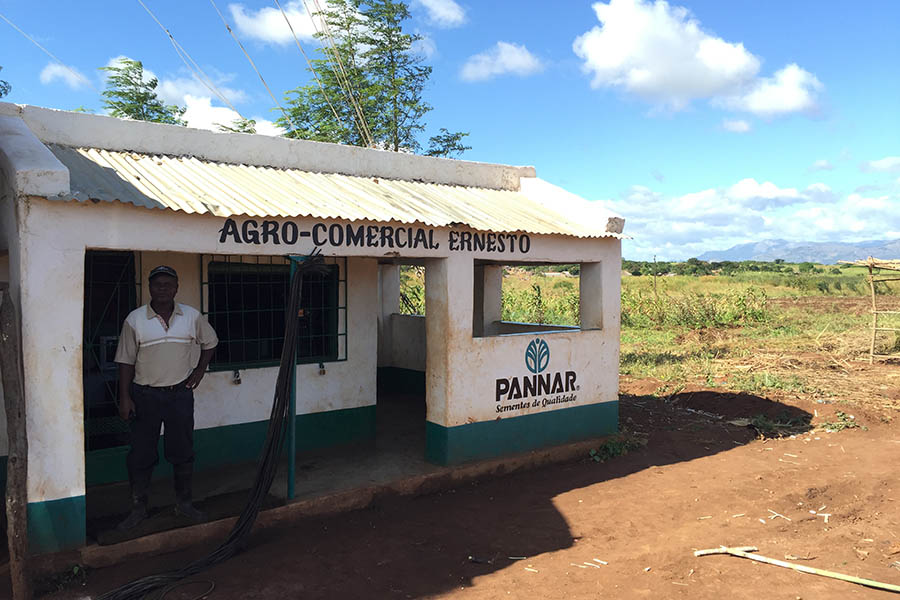DEVELOPING ALTERNATIVES
Case Study: Overcoming Land Tenure Issues to Stimulate Investment in Mozambique
Nov 8, 2018
In Mozambique, the Innovation for Agribusiness project (InovAgro) uses a market systems approach to encourage investment by smallholder farmers in agricultural productivity, thereby boosting their incomes. But many of those smallholders find themselves increasingly at risk of losing their land to large investors who, with the backing of the government, are looking to start commercial farming operations encompassing thousands of hectares. This precarious state of affairs, which is in large part due to the government’s very limited formal recognition of smallholder land holdings, has made small farmers more and more reluctant to invest in their land.
Seeing the need to disrupt this cycle, InovAgro set out to improve land tenure security, then—crucially—follow up with efforts to expand access to services in those more tenure-secure regions.
A principal constraint in Mozambique’s market system for land is its bureaucracy. On paper, the country has a relatively progressive land law. But its land administration system is arguably less developed than, say, Ethiopia’s, and its actual capacity to deliver land certificates is severely limited. While there is a formal process for obtaining a long-term land leasehold, known as a DUAT, it is an expensive and time-consuming chore for farmers, and the actual number of DUATs the authorities can generate is small.
However, Mozambique has a second, albeit slightly less binding form of land recognition; namely, community land delimitation, which registers the boundaries of the community’s land and issues a certificate for the entire community that is recorded in the provincial land cadaster office. Easier, faster, and cheaper to obtain that the DUAT, this form of land registration can give the community some formal recognition of its lands and a bargaining position if the government tries to give that land away without proper consultation or authorization—and InovAgro found it can serve as a starting point for the more elaborate DUAT process.
In a pilot activity, InovAgro worked with local nongovernmental organizations to raise awareness around land registration in four communities—representing 17,225 people—and develop a network of land committees and paralegals. With InovAgro’s assistance, the communities and its cadre of paralegals were able to delimit their lands and register them with the provincial land cadaster office, the SPGC. In addition to improving tenure security for these pilot households, registration helped two of the communities resolve conflicts with encroaching investors.
Key to this success were the 57 trained paralegals, who are now recognized by the SPGC as valuable intermediaries in preparing communities and georeferencing communal land for the titling process. Moreover, the availability of what are essentially local service providers has enabled individuals to more easily start the DUAT process. By September 2018, 2,000 households had taken advantage of the paralegal services to file land demarcation applications for DUATs with the SPGC.
From Tenure Security to Economic Benefit
To help farmers take advantage of their increased tenure security, InovAgro is also facilitating their access to better financial, input supply, and output marketing services. Based on the understanding that farmers more assured of tenure security will likely invest more, InovAgro has informed its private sector partners of the new opportunities in those communities.
Leveraging its relationships with nine seed companies, for example, InovAgro has highlighted the stronger potential demand for inputs from newly land-secure households, and the input suppliers have increased their marketing and demonstration activities accordingly. In 2018, one input company opened shop in one of the districts and started organizing demonstrations for farmers. Two additional seed companies are considering opening retail outlets in those communities as well, and in general seed companies anticipate strong initial sales in the InovAgro pilot communities.

Given the visible interest and growing presence of these companies, 1,249 smallholders working in 44 groups have started participating in a Savings for Seed program to increase their purchasing power. Based on our experience of such programs in other communities, participation is likely to increase rapidly as the benefits are observed by other community members. InovAgro is also alerting financial institutions to the new opportunities inherent in a more land-secure market. BancABC, for instance, has already started identifying agents to offer services in these communities.
At the same time, an output marketing company has opened three branches to buy crops in those communities, purchasing maize, soya beans, sesame, groundnuts, and pigeon peas. Two additional output buying companies plan to open branches in those communities in 2019, stoking competition for the crops.
It looks very much like tenure security is working to the economic benefit of the farmers.